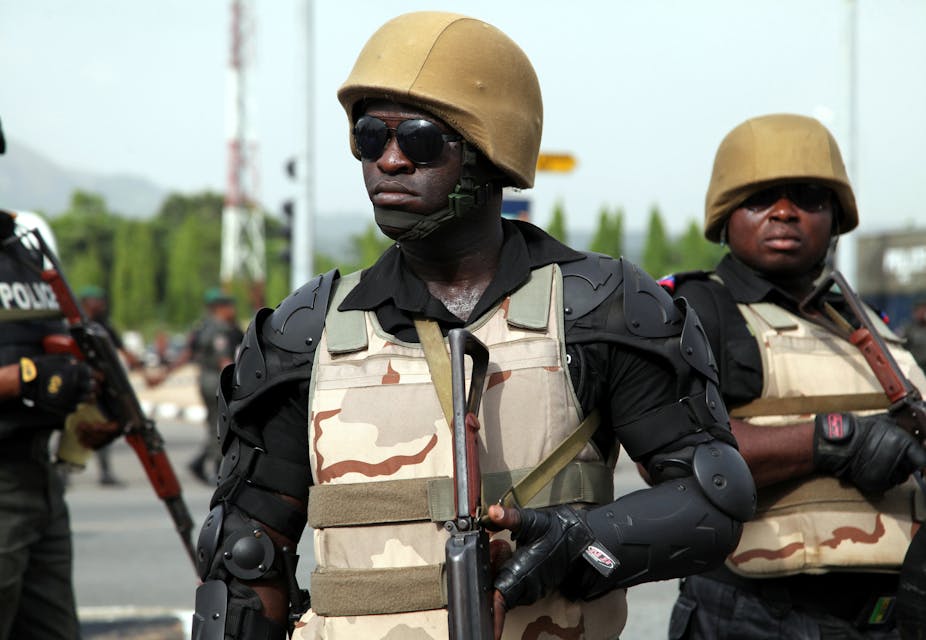There has been a rising wave of attacks on police stations and police officers in some southern states in Nigeria. At the last count, 127 cops had been killed and 25 stations razed in the past five months. The Conversation Africa’s Wale Fatade asked sociologist Lanre Ikuteyijo for his view on why this is happening and how the country can stop the attacks.
What do you think is responsible for these attacks?
Judging by indicators from the media over the past five months, my view is that the attackers have risen on the wings of the call for secession by separatists in the south east.
Also on rising insecurity from activities of bandits and herdsmen across the country. The Eastern Security Network, for example, an unofficial separatist militia, claimed that one of its objectives was to mitigate the attacks of Fulani herdsmen and prevent banditry from spreading to the region.
There is also political rivalry among some politicians from the south east who have been accusing each other of sponsoring the attacks. Another possible catalyst is the recent #EndSARS protests which exposed cases of police brutality across the country.
Read more: Why disbanding the notorious anti-robbery squad won't stop bad policing in Nigeria
In the south west, there were reports of attacks on police officers by errant citizens. These incidents cannot be totally separated from one another as they are happening in the same social context. Two examples are the truck driver who attacked a police traffic officer and the man who attacked another police officer for trying to arrest him for violating the one-way traffic rule in Lagos.
What are the likely effects of these incidents on security and on police?
The attacks have dire consequences for the security and wellbeing of Nigerians.
Firstly, these attacks damage essential public infrastructure as the attackers often target police stations and vehicles acquired with public funds. Secondly, the attacks contribute to the rising insecurity in the country. For instance, during one of the several attacks in Imo State, the gunmen allegedly hijacked several vehicles from their owners and used them to carry out the attacks. Another dangerous dimension is the release of prison inmates and suspects from police custody.
The arms and ammunition taken from police stations and prisons during these attacks are very likely to be used against members of the public. The attacks could also have spiral effects on the security of neighbouring states. For example, the governors of Abia and Ebonyi states had to impose curfews following attacks in neighbouring Imo State.
These attacks must be viewed against the influx of illegal arms into the country. Nigeria’s secret police recently accused the Indigenous People of Biafra of moving explosives from Lagos to Imo in order to destabilise the state. Recently, a truck loaded with ammunition was discovered in Onitsha, Anambra State.
The police force, as an institution, is a symbol of collective consciousness and national identity. Police legitimacy is about the readiness of the public to cooperate with and support the police. Attacks on police officers therefore could be an indication of people’s perception of the police. If they are not seen as legitimate, people may look for alternatives in self-help policing. This is similar to events that culminated into the truncation of the first and second republics in Nigeria.
How do you think the police should respond?
Although the police response to these attacks has been commendable so far, there is room for improvement. The police response has been very coordinated, unlike before when they would have resorted to mass arrests and unbridled use of counteroffensive strategies.
First, they must consolidate community partnership efforts to gain the support of law-abiding citizens in the fight against attackers. Public enlightenment efforts must be strengthened to educate citizens about the harm these attacks do. This is necessary in the light of the ethnic sentiments like the call for self determination, rising ethnic intolerance and the quest for secession.
The police also need to step up intelligence gathering and visible policing. There is no better time for the police to have the cooperation of citizens. Police legitimacy is enhanced where people trust them and are ready to volunteer information to them.
The police must also collaborate more with other security agencies to draw on their various capabilities.
Read more: Nigeria has a new police chief. Here's an agenda for him
What can Nigeria do to prevent these attacks?
Nigerians must come together and condemn these attacks. No one must give support to these attackers in any form. Nigeria needs to strengthen the country’s security by encouraging training and retraining of security personnel. The welfare of security agents should equally be of concern. Politicians should put the national interest above their own. They can only realise their political ambition in a safe and secure country.
Nigerians, irrespective of their tribe, religious and ethnic affiliation, must also realise that they have more to gain in a united Nigeria than a divided nation. Residents of these violence-prone areas have a lot to do by providing the police and other security agencies with information on criminal elements.

